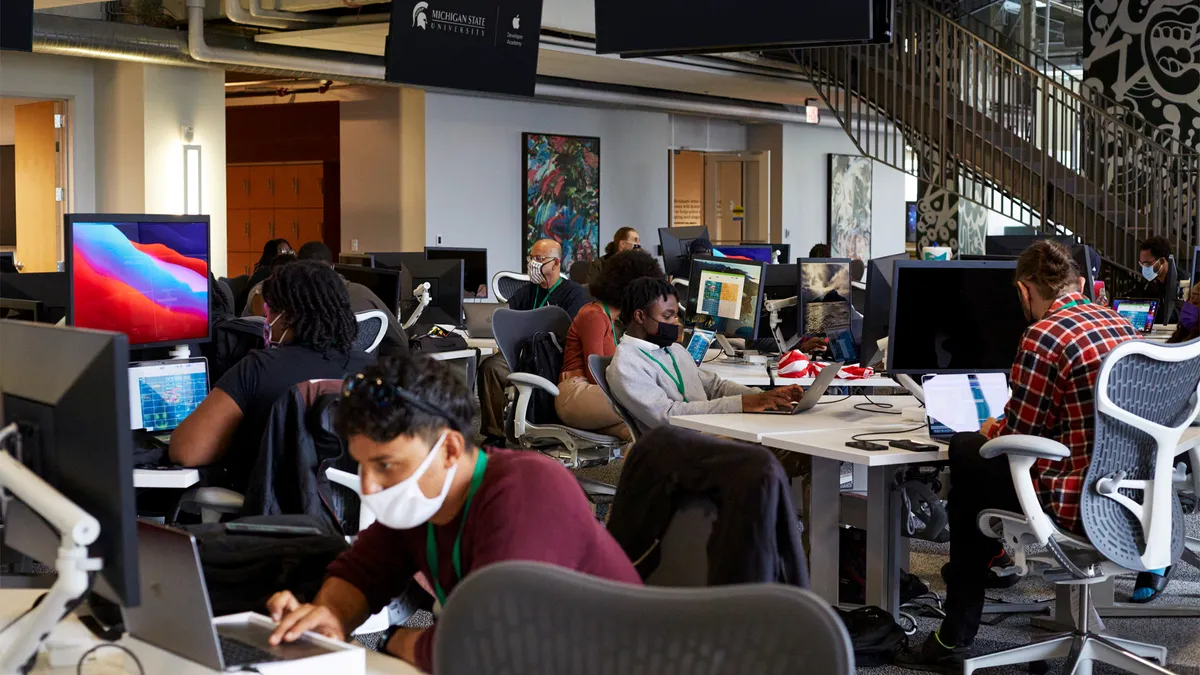It’s been said that learning is only as good as its impact on behavior. In the workplace, employee behavior has a direct bearing on individual performance. Obviously, most workers arrive with a track record of some successes, but outside of certain behavioral traits, how can an organization be sure that it’s hiring people who have the right skills that are future-proof?
In a business world where technology and economic conditions dictate if businesses will thrive, choosing candidates who have strong skills, including a propensity for learning, can form a solid foundation.
What are the top in-demand workforce skills for the coming year?
Analysts with the most well-known learning and recruitment platforms have been focusing on the key skill sets that make candidates successful. Udemy for Business, which is the online marketplace for team virtual learning, released their Learning Index Report, which highlighted the emerging skills and trends that we may see in 2017.
There is a growing interest in artificial intelligence and on-demand learning programs that will help move employees into more challenging roles. The Udemy study indicated that:
- More agile workplaces – this will be facilitated by new technology that requires flexible task management and processes. Soft skills will take the forefront as employees adapt to multiple roles.
- Increase in personalized learning – employees will increasingly train using on-demand self-service learning models that have a more actionable result. Companies will worry less about credentials, prioritizing skills learned instead.
- Learning and development experts rise to the top – Udemy predicts 2017 is the year that greater immersion in virtual learning officers take their place at the decision-making table. Candidates who have strong learning and development skills and experience will be leaned on for future learning programs.
- Reality goes virtual - more training will take place in virtual reality environments (think Pokémon Go), especially in manufacturing and construction, due to skill shortages in these industries.
We also looked to LinkedIn, the leading professional social networking site, to learn more about what skills are most in-demand. Blair Decembrele of LinkedIn spoke with HR Dive about what’s currently trending.
HR Dive: What sorts of candidate skills are in most demand, and how might that change in 2017?
Decembrele: We just released our annual list of the Top Skills of 2016, gleaned from an analysis of all of the hiring and recruiting activity that occurred on LinkedIn in 2016. Cloud and Distributed Computing took the #1 spot worldwide for the second year in a row. While we expect this skill to rank high again this year, there were a few newcomers to the list that could become increasingly important in 2017. For the first time ever, Data Presentation made the list, signaling employer demand for candidates who can take complex information and illustrate it in a clear way.
Overall, while some skills expire every couple of years, our data strongly suggests that tech skills will be highly coveted for years to come. That’s due to the fact that these skills are no longer relegated to the tech industry; they’re needed in nearly every industry and region globally.
HR Dive: In 2017, do you think companies will hire more candidates based on skills rather than pedigree?
Decembrele: Companies are increasingly examining non-traditional credentials, like bootcamps or online certifications, when looking to fill certain roles. We know the useful shelf life of professional skills has shrunk to less than five years so there is a critical need for professionals to pursue ongoing learning. As in-demand skills continue to shift, we’re going to see an acceleration in the need for continuous, digital learning to keep pace with today’s environment.
HR Dive: How do you think employers will approach soft skill development in 2017? In 2020?
Decembrele: We commissioned a survey last year of US hiring managers and discovered that 59% of them believe that soft skills are difficult to find. Yet, employers are increasingly looking for workers with these skills — those traits that don’t necessarily show up in a job posting but are essential for succeeding in the workplace, like communication and critical thinking.
Realizing the growing need to address this soft skills gap, job-training and apprentice programs are increasingly factoring soft skills into their technical training curriculum. Not surprisingly, we saw a number of soft skill courses — Communication, Time Management and Management Fundamentals — topping the list of Most Popular LinkedIn Learning Courses this past year. We expect this trend to accelerate this year and beyond.
HR Dive: What can organizations do now to ensure their employees are getting enough of the right kinds of training in 2017 in order to be competitive?
Decembrele: Companies must consider their learning strategy as part of their corporate strategy, not just an HR tactic. Companies will risk losing revenue, top talent and new opportunities if they fail to integrate learning into their day-to-day business. Furthermore, corporations that can provide continuous and embedded (vs. solely event-based) opportunities to learn will see the most engagement and ROI. With the recent launch of LinkedIn Learning, organizations can identify which employee skills are key for achieving their business goals and then train those skills in a personalized, efficient and measurable way.
--
To summarize, the skills that will be most coveted moving into 2017 and beyond will include those pertaining to technology, software, learning and development as well as soft skills that are easily adaptable to whatever challenges companies face in the new administration. Candidates can position themselves well by embracing learning, and companies can benefit from hiring such individuals.
* 1/11/17 Update: We erroneously mentioned that the LinkedIn interview was with Catherine Fisher, when it was actually with Blair Decembrele.




















